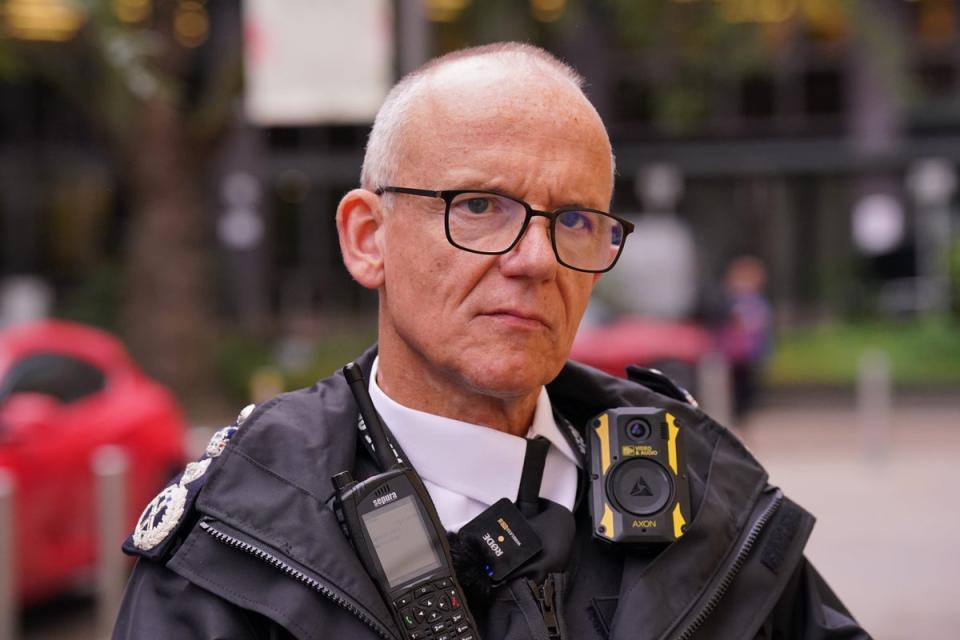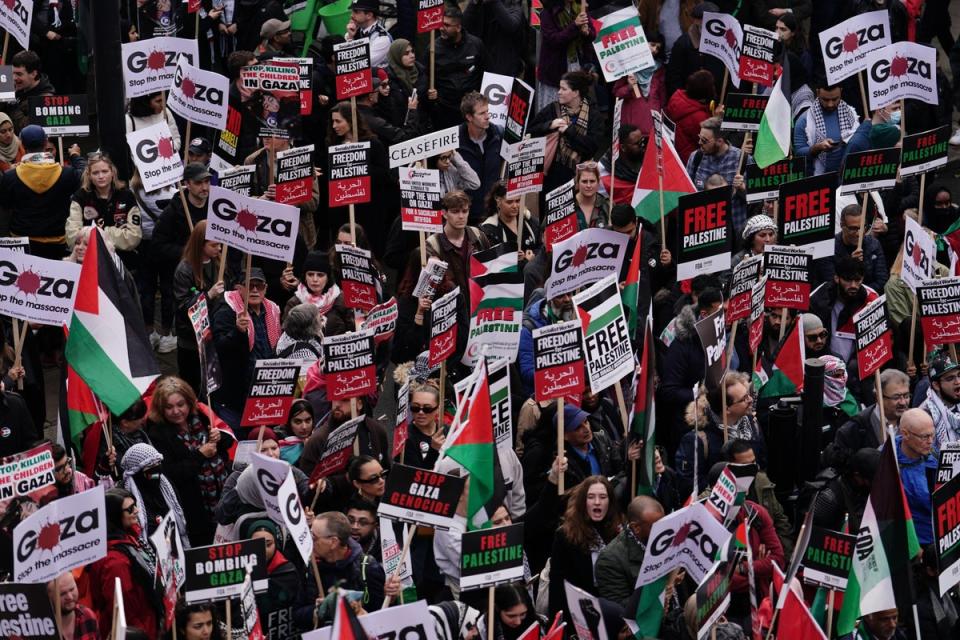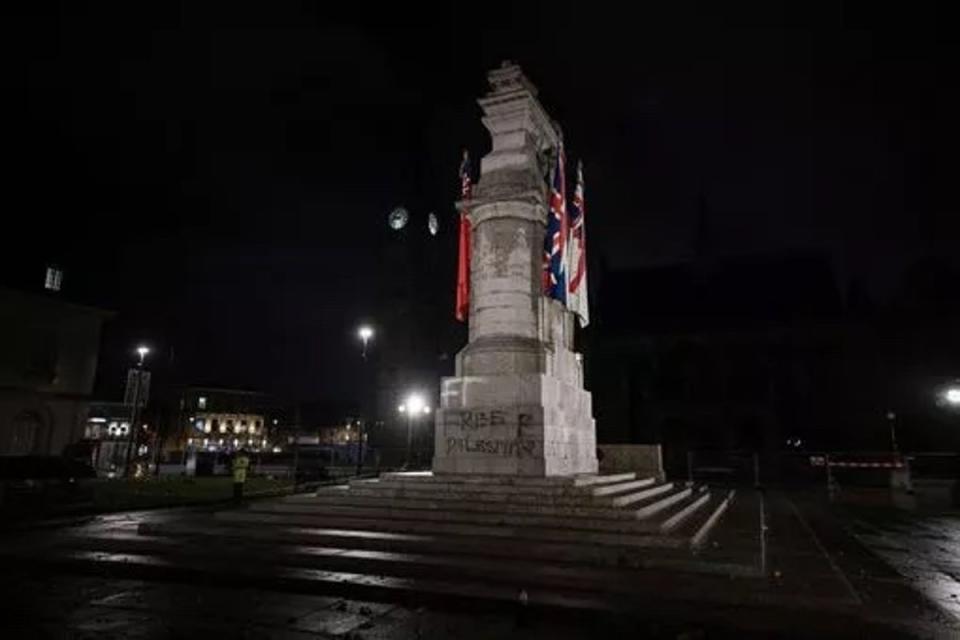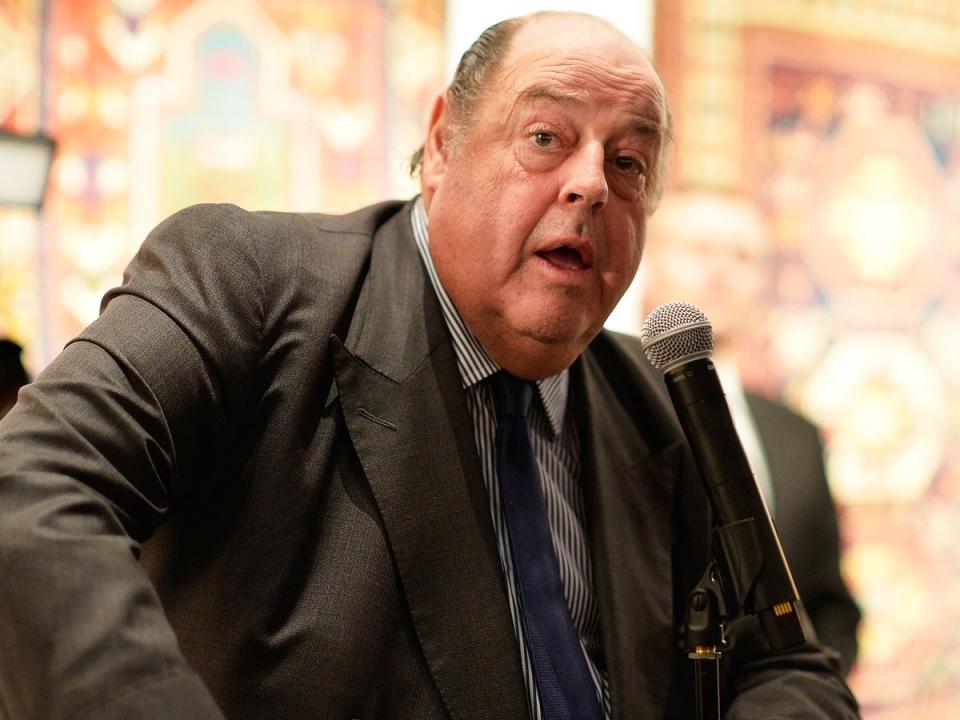Rishi Sunak threatens Met Police chief over decision not to ban Pro-Palestine Armistice march
Rishi Sunak has warned the Metropolitan Police Commissioner that he will hold him “accountable” for his decision to greenlight a “disrespectful” pro-Palestinian demonstration on Armistice Day.
The prime minister summoned Sir Mark Rowley to a meeting on Wednesday to answer questions on how he plans to keep the public safe, forcing the commissioner to pull out of a planned appearance at a Westminster think tank.
The extraordinary intervention came after Sir Mark resisted mounting pressure on the force from politicians, including Mr Sunak ad Suella Braverman, to block the protest calling for a ceasefire in the Gaza Strip in London on Saturday, amid fears it could disrupt Remembrance commemorations.
The country’s top officer said on Tuesday that the march could go ahead, insisting concerns over unrest did not meet the threshold for a ban, which can only be obtained if there is a “real threat” of serious disorder.
But the fierce row showed no signs of slowing on Wednesday, as:
No 10 insisted Mr Sunak was not pressuring the Met into banning the protest, despite Sir Mark being grilled by the prime minister over his decision
Labour leader Sir Keir Starmer accused Mr Sunak of “cowardice” for “picking a fight” with the force
Fears continued over a potential right-wing backlash or counter demonstrations if the rally goes ahead
Protest organisers accused the government of “playing politics” and “stoking up fears” fears with the intervention, but insisted they won’t be deflected
Mr Sunak, who previously denounced the planned protest on Armictice Day as an “affront to the British public”, revealed he had called Sir Mark in for crunch talks on Wednesday.
Speaking to broadcasters during a visit to a school in Lincolnshire, he said: “This is a decision that the Metropolitan Police Commissioner has made.
“He has said that he can ensure that we safeguard remembrance for the country this weekend as well as keep the public safe. Now, my job is to hold him accountable for that.
“We’ve asked the police for information on how they will ensure that this happens. I’ll be meeting the Metropolitan Police Commissioner later today to discuss this.
“More broadly, my view is that these marches are disrespectful and that’s what I’ll be discussing with the Police Commissioner later today.”

Sir Mark, who has not responded to Mr Sunak’s threat, had been due to appear at an event on the future of the Met at the Institute for government this afternoon, but it was postponed at the last minute after the PM summoned him for questioning.
Labour leader Sir Keir Starmer accused Mr Sunak of “cowardice” for “picking a fight” with the Met, writing on X: “Remembrance events must be respected. Full stop.
“But the person the PM needs to hold accountable is his home secretary. Picking a fight with the police instead of working with them is cowardice.”
However Downing Street insisted Mr Sunak was not attempting to pressure Sir Mark into banning the protest.
The PM’s official spokesman said: “The Met are operationally independent, it’s the job of the prime minister and the government to hold them to account for their approach. So, that is what the prime minister will be doing.”
The spokesman insisted the Met’s current position is “not the end point” and the situation will be kept under review as the protest nears.
Mr Sunak’s meeting with Sir Mark is understood to have been focussed on whether the commissioner had considered all options and had tested the approach to the decision to let the protest go ahead.
Under section 13 of the 1986 Public Order Act, a police chief can ask the home secretary to ban marches to avoid serious public disorder.
However, Sir Mark has resisted calls to use the powers, saying on Tuesday: “The reason we have an independent police service is so that among debate, opinion, emotion and conflict, we stand in the centre, focused simply on the law and the facts in front of us.
“The laws created by Parliament are clear. There is no absolute power to ban protest, therefore there will be a protest this weekend.”
He added that use of the power to block moving protests is “incredibly rare” and should only be used if there is intelligence to suggest a “real threat” of serious disorder.
He said organisers of Saturday’s rally have shown “complete willingness to stay away from the Cenotaph and Whitehall and have no intention of disrupting the nation’s remembrance events”.
“Should this change, we’ve been clear we will use powers and conditions available to us to protect locations and events of national importance at all costs,” he added.
The Met had previously appealed for march organisers to “urgently reconsider” the event on Saturday, but the pro-Palestinian coalition behind it refused to call it off.
🚨The route for this Saturday's Ceasefire Now March for Palestine has now been confirmed. 🇵🇸
It will be assembling on the east side of Park Lane at 12 noon, 11 November, and marching across Vauxhall Bridge to the US embassy in Nine Elms Lane.#CeasefireNOW #FreePalestine pic.twitter.com/ZktEEV23LD— PSC (@PSCupdates) November 8, 2023
The coalition of groups, which includes the Palestine Solidarity Campaign (PSC), Stop the War and the Muslim Association of Britain, published their route on Wednesday, which will take demonstrators from Hyde Park at midday - about a mile from the war memorial in Whitehall - to the US embassy in Vauxhall, south of the Thames.
Thousands have joined weekly events led by the organisers since the Israel-Hamas conflict broke out on 7 October, resulting in a handful of arrests, but police said most had demonstrated peacefully at last week’s rally in Trafalgar Square.
Organisers accused the government of “playing politics” and “stoking up fears” fears with the latest intervention, but insisted they won’t be deflected by the “deeply irresponsible” comments.
Challenging the prime minister’s actions, PSC director Ben Jamal told Radio 5 Live: “Why are you stirring up risk of public disorder? Why you greenlighting far right groups, why you’re not acting responsibly?”

At the same school visit, Mr Sunak blasted the vandalism of the Rochdale Cenotaph, adding the “desecration of war memorials is absolutely sickening”. Greater Manchester Police officers were guarding the landmark after graffiti was sprayed on it and poppy wreaths were damaged in two separate incidents this week.
Mr Sunak’s warning to the commissioner came after health secretary Steve Barclay insisted there should be “ongoing discussions” over Saturday’s march, which he described as “provocative”. His cabinet colleague Lucy Frazer, who is Jewish, also called for the Met to keep the “very provocative” march “under review”.
Meanwhile, fears continue that far right groups and counter demonstrations could ramp up tensions or clash with pro-Palestine protesters on Saturday.

English Defence League founder Tommy Robinson, whose X account was reinstated this week, posted: “British men are mobilising for Saturday to be in London.”
A call to arms has also been issued by the Democratic Football Lads Alliance, a right-wing organisation that uses football fan networks to spread Islamophobic hate, to “join us in standing shoulder to shoulder with our veterans that fought for our freedom”.
Despite the mounting controversy over the demonstration, Winston Churchill’s grandson Sir Nicholas Soames, a former armed forces minister, defended the right to protest.
“It’s nowhere near the Cenotaph. It’s in the afternoon and most of these people, 90 per cent of those people are not there to make trouble,” he told LBC.
“They’re there to express a deeply held view. And I think it must be allowed to go ahead and I think it would be a great mistake to play politics with it.”

He also challenged home secretary Suella Braverman’s description of the pro-Palestine protests as “hate marches”, adding: “There are some people who attach themselves, as you know, to every demonstration and that is my one fear about Saturday - but the police will handle that.”


